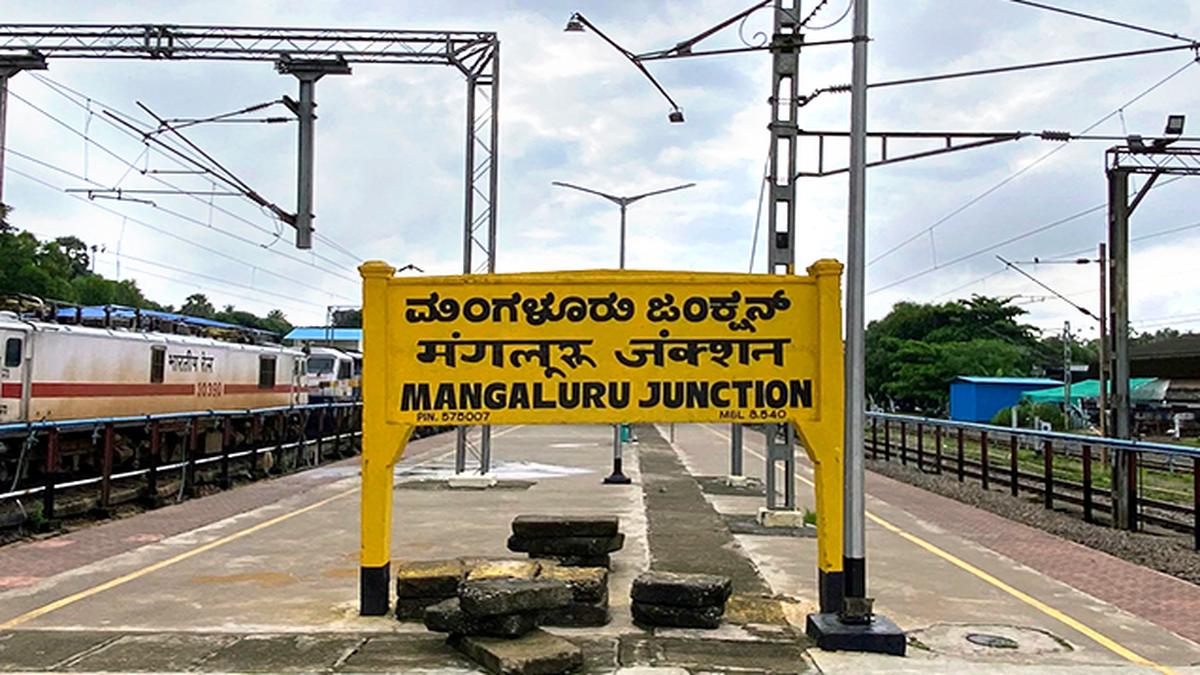
MPs join passengers in demanding regularisation of Vijayapura-Mangaluru Junction Express Special service
The Hindu
Passenger associations in Mangaluru, Davanagere, Hubballi and Vijayapura, Dakshina Kannada MP Nalin Kumar Kateel and Vijayapura MP Ramesh C. Jigajinagi have urged the Railway Ministry not only to regularise the service, but also extend it from Mangaluru Junction to Mangaluru Central Railway Station for the benefit of passengers.
The demand to regularise Vijayapura-Mangaluru Junction Express Special on special fare is increasing. The service has been operational for nearly for two years now.
Passenger associations in Mangaluru, Davanagere, Hubballi and Vijayapura, Dakshina Kannada MP Nalin Kumar Kateel and Vijayapura MP Ramesh C. Jigajinagi have urged the Railway Ministry not only to regularise the service, but also extend it from Mangaluru Junction to Mangaluru Central Railway Station for the benefit of passengers.
In his September 11 letter to Railway Minister Ashwini Vaishnaw, Mr. Jigajinagi stated that the train is being run as a special for nearly two years, and the same should be regularised immediately, as per the proposal sent by South Western Railway (SWR) on September 12, 2022.
SWR had recommended regularisation of Train No. 07377/07378 Vijayapura-Mangaluru Junction Express Special, among other trains, stating that the train has very good patronage. The Indian Railway Timetable Committee (IRTTC) too had recommended its regularisation in 2022.
Mr. Jigajinagi told the Railway Minister that the train is the only service connecting north Karnataka and Mangaluru, and has huge patronage.
The train leaves Vijayapura at 6.35 p.m. and Hubballi at 11.55 p.m. to reach Mangaluru Junction at 12.40 p.m. the next day. It leaves Mangaluru Junction at 2.50 p.m. and Hubballi at 3.35 a.m. to reach Vijayapura at 9.35 a.m. the next day. The timings, the MP wrote, are inconvenient for passengers.
He suggest that the train leave Vijayapura at 4 p.m. and Hubballi at 9.30 p.m. to reach Mangaluru Junction at 9.30 a.m. In the return direction, he suggested that the train leave Mangaluru Junction at 5 p.m. and Hubballi at 5 a.m. to reach Vijayapura at 10.30 a.m.

“Writing, in general, is a very solitary process,” says Yauvanika Chopra, Associate Director at The New India Foundation (NIF), which, earlier this year, announced the 12th edition of its NIF Book Fellowships for research and scholarship about Indian history after Independence. While authors, in general, are built for it, it can still get very lonely, says Chopra, pointing out that the fellowship’s community support is as valuable as the monetary benefits it offers. “There is a solid community of NIF fellows, trustees, language experts, jury members, all of whom are incredibly competent,” she says. “They really help make authors feel supported from manuscript to publication, so you never feel like you’re struggling through isolation.”

Several principals of government and private schools in Delhi on Tuesday said the Directorate of Education (DoE) circular from a day earlier, directing schools to conduct classes in ‘hybrid’ mode, had caused confusion regarding day-to-day operations as they did not know how many students would return to school from Wednesday and how would teachers instruct in two modes — online and in person — at once. The DoE circular on Monday had also stated that the option to “exercise online mode of education, wherever available, shall vest with the students and their guardians”. Several schoolteachers also expressed confusion regarding the DoE order. A government schoolteacher said he was unsure of how to cope with the resumption of physical classes, given that the order directing government offices to ensure that 50% of the employees work from home is still in place. On Monday, the Commission for Air Quality Management in the National Capital Region and Adjoining Areas (CAQM) had, on the orders of the Supreme Court, directed schools in Delhi-NCR to shift classes to the hybrid mode, following which the DoE had issued the circular. The court had urged the Centre’s pollution watchdog to consider restarting physical classes due to many students missing out on the mid-day meals and lacking the necessary means to attend classes online. The CAQM had, on November 20, asked schools in Delhi-NCR to shift to the online mode of teaching.









